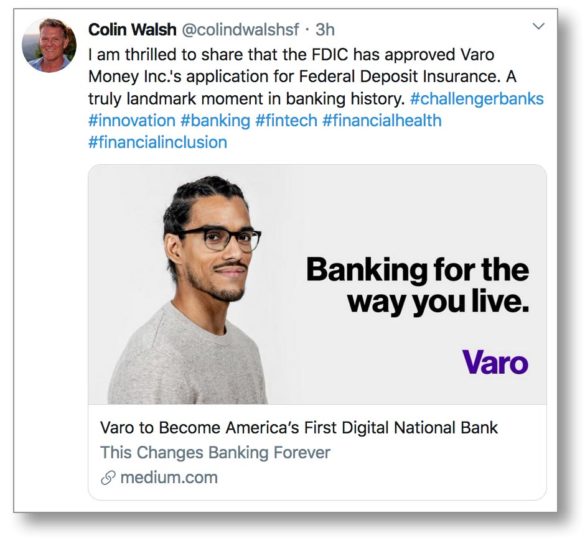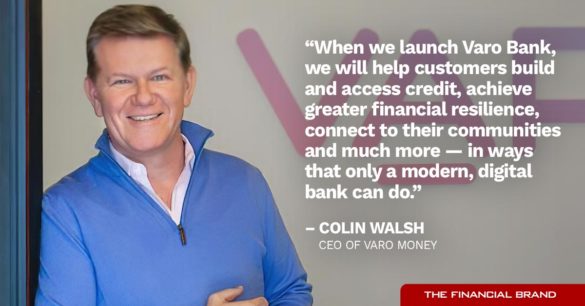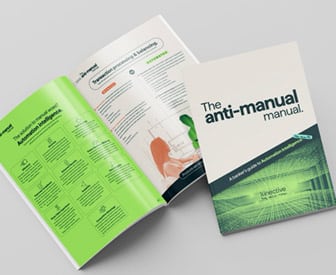Varo Bank, N.A., moved a giant step closer to launching with the February 2020 FDIC approval of its application for federal deposit insurance coverage. The bank, envisioned as the first U.S. mobile-centric chartered financial institution, could go live as soon as the second quarter of 2020. Assuming that no hitches arise, it will be the culmination of about a four-year journey.
Varo Money, the proposed bank’s parent, received preliminary approval for a full-service national bank charter in September 2018 from the Comptroller of the Currency, contingent in part on receiving FDIC coverage. Now the bank faces the final hurdles of completing organizational requirements and other conditions set by the Comptroller to open for business.
Longer Road May Turn Out to Be Faster One
Varo Money, which started in 2015, chose to take the route of seeking a full-service charter after rejecting the so-called “fintech charter.” This has enabled its application to keep moving forward. By contrast, the Comptroller’s specialized fintech charter continues to be mired in legal challenges. In December 2019 OCC filed its intent to appeal a federal trial court’s decision to uphold a challenge against the fintech charter by the New York State Department of Financial Services. The fintech charter does not including deposit-taking powers.
In issuing its order approving insurance, FDIC made routine stipulations regarding capital levels as well as requirements that changes to Varo Bank’s board and business plan be subject to regulatory approval for three years.

Banking Transformed Podcast with Jim Marous
Listen to the brightest minds in the banking and business world and get ready to embrace change, take risks and disrupt yourself and your organization.

The Power of Localized Marketing in Financial Services
Learn how to enhance your brand’s local visibility, generate more leads, and attract more customers, all while adhering to industry regulations and compliance.
Read More about The Power of Localized Marketing in Financial Services
“Receiving an official bank charter has been part of Varo’s vision from the very beginning, and we are excited to progress through the necessary steps to accomplishing that goal,” said Colin Walsh, CEO of Varo Money. He added in a statement that Varo is committed to “creating inclusive financial opportunities” for all consumers.
“Becoming a fully chartered bank will give us greater opportunity to deliver products and services that positively impact the lives of everyday people around the country,” he said.
To date Varo has been providing consumers with no-fee banking accounts joined with a money-management app, a Visa debit card, fee-free ATM access, and high-interest savings accounts. Varo has relied on The Bancorp Bank, which specializes in banking-as-a-service for many types of organizations, to provide the deposit products. Opening as a chartered bank will enable Varo to offer insured deposit products directly. Varo also plans to expand into additional financial services, among them credit cards, loans, and additional savings products.
Read More:
- Marcus: A Digital Bank That Should Keep Rivals Up At Night
- Fintech Deals Seen As Innovation Shortcut By Financial Institutions
- Digital Overtaking Branches as the Place Consumers Get Advice
What a Modern Digital Bank Can Do
In a blog posted on Medium.com the same day news of the approval hit the street, Walsh wrote of consumers who have said how Varo Money has improved their lives. Varo has positioned itself as a pro-consumer bank, and a response to what people don’t like about traditional financial institutions, such as overdraft fees. The company also offers early access to payroll funds that are direct deposited.
“When we launch Varo Bank, we will help customers build and access credit, achieve greater financial resilience, connect to their communities and much more — in ways that only a modern, digital bank can do,” wrote Walsh. “In essence, the bank charter will help us make an even bigger difference in people’s lives.”
The fintech CEO is no stranger to mainstream banking, particularly of the big-bank variety. Earlier in his career he worked at Lloyds Banking Group, Wells Fargo and American Express.
A key advantage of a national charter over a state bank charter is the ability to perform most activities on an interstate basis while having to comply solely with federal laws and regulations. Early on in the fintech era some organizations, such as marketplace lenders, found that they had to obtain licenses, such as authorizations to operate a money service business, in every single state they wished to operate in. And only chartered banks and credit unions can directly offer federally insured deposits.
At the time that its charter received preliminary approval, Varo stated that “a national bank charter will also allow Varo to streamline operations, lower banking and lending costs further, and increase the pace of customer-focused innovation.
Navigating the Federal Regulatory Process
Throughout the debate over fintechs obtaining banking charters, experts have pointed out that the word “capital” has different meanings to regulators and traditional bankers versus the venture capitalists, who are behind Varo. To the former, it is a cushion for safety and soundness, while to the latter capital is fuel for growth.
In getting so far down the regulatory gauntlet, Varo has demonstrated adaptability. Notably, on FDIC’s website a number of groups organizing traditional banks, while obtaining insurance approval, for various reasons have not continued their plans, and are marked “will not open.”
A few fintechs, including Rakuten, the Japanese ecommerce giant, and Square, active in small business finance and payments, have pending applications in Utah for industrial bank charters. They were still awaiting deposit insurance approval in early February 2020.









